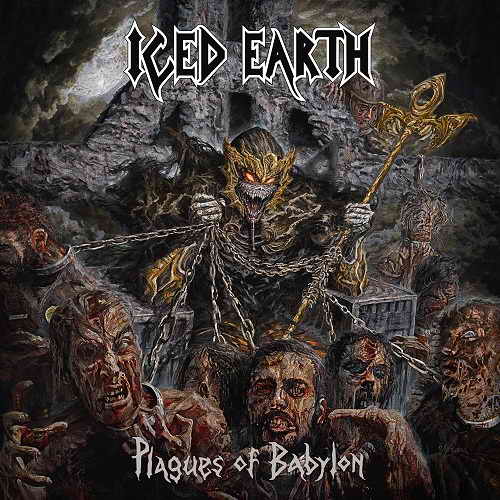Iced Earth - Plagues of Babylon [Thrash Metal/Power Metal]

It's been a long while since anyone has posted on this blog, so I thought it'd be good to write a review of an album I'd anticipated for quite a while.
Unlike most of the legions of hardcore Iced Earth fans, I did not grow into the band during the Matt Barlow era - as such it is to be expected that this review will not attempt to draw too many comparisons between Barlow and current Iced Earth vocalist Stu Block.
At this juncture I must point out: despite not being an Iced Earth follower from the early days, I obviously took it upon myself to listen to the work that the band did with Barlow and Ripper; I have tremendous respect for the abilities of both singers, and can totally understand why so many people continue to pine for Barlow's return (not happening, people - get over it! hahaha). Barlow was a fantastic technical singer in his own right: good range, great power and rich tone. However, what stood out most about his singing was the quality of his delivery - it's one thing to sing a song and another to own the hell out of it.
I have to say now: Stu Block owns the hell out of a few songs on this album. I've always thought - and Iced Earth hardcores can hate on this all they want - that Stu Block, dating from his time with Into Eternity - is a far more technically-proficient and stylistically versatile singer than either Barlow or Ripper ever were.
Evidence of Stu's vocal chops can be found in tracks like 'Cthulhu' - where Stu busts out a piercing Rob Halford-style scream - and the surprisingly accessible piece 'If I Could See You' - where, during the clean verses, Stu channels his inner Myles Kennedy and goes all rock-ballad. A minus point here, though, is that Stu's vocals, at least the clean bits, were obviously auto-tuned, even though clearly he doesn't need the aid of software. God forbid that Iced Earth eventually trends towards the direction taken by 'rock' bands like U2.
However, not much can be said in the defence of the rest of the band in this album. Notwithstanding that Jon Schaffer and company did well showcasing their new vocalist (as well as guest stars like Hansi Kursch and Russell Allen), the riffing and song structure were pretty much standard Iced Earth fare - not that that's necessarily a bad thing, but after a couple of decades doing this you'd think the band would wish to take the chance to innovate. At times, it felt like the sporadic moments of brilliance from Stu and the blistering guitar solos from Troy Seele - who is in fine form here, by the way - were placed strategically to ensure that any attention lost during the verse and bridge segments was regained.
The album as a whole had a rather mid-tempo feel to it, replete with the usual Jon Schaffer-driven cliches (harmonised guitar breaks, E-flat tuning, and a ton of open string chugging). Objectively speaking - not one of Iced Earth's more inspired offerings. Also of note: this is also the Iced Earth debut of drummer Raphael Saini and bassist Luke Appleton, but you wouldn't know it, because there is nothing about the rhythm work to separate this album from the rest of Iced Earth's considerable body of work - not that this can be attributed directly to the two of them, though.
Overall, you can almost sense that during the songwriting phase, the band leaders decided that they would actively attempt to utilise the considerable talents of Stu Block - not a bad thing, mind - but in doing so compromise on any attempts to write new harmonic and rhythmic material. What this album offers in terms of vocal and melodic interest is largely negated by the blandness of the riffing ideas and the almost-lethargic feel of much of the songs.
★★☆☆☆ Passable - One or two good songs, a bit of flow
Written by: The Buona Vista Musician





























